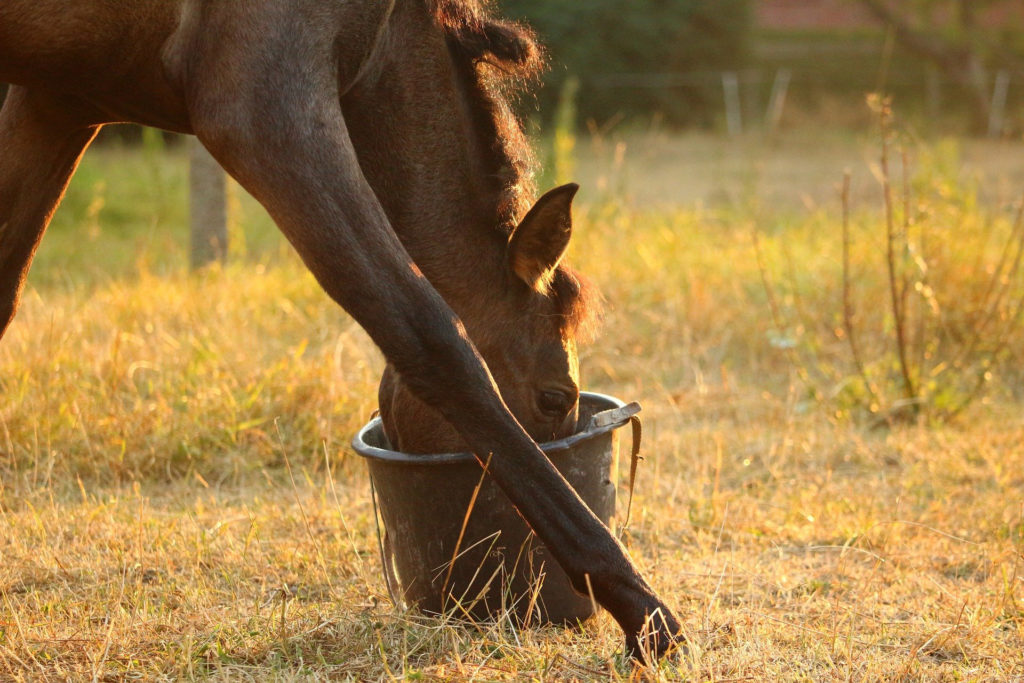You know the old saying, “No hoof, no horse”? Hoof health is crucial to the overall health and wellbeing of your horses. While there are many factors that can influence how healthy your horse’s hooves are, their hydration plays a critical role. Here, we’ll go over some of the various factors that can affect your horse’s hooves, the major impact of water on your horse’s hoof health, and what you can do to make keeping your horses hydrated easier than ever. Let’s get into it.

How Much Water Do Horses Need?
Approximately 60-80% of your horse’s daily nutritional intake is water, according to well-known animal nutritionist, Gary Pusillo. Horses typically drink about half a gallon of water for every pound of hay eaten. This usually ends up being about 10-15 gallons of water a day, though this varies depending on the horse, their lifestyle, and their health.
How Does Hydration Affect A Horse Hoof?
About 12-15% of the hoof horn is water. This means that if your horse’s hoof wall starts crumbling, is brittle, and is generally in poor condition, this may be because your horse isn’t well-hydrated. Water is a crucial nutrient for the cellular functions that keep hoof tissues hydrated, to maintain dermal blood flow to the hoof, and to deliver nutrients to the epidermal cells that are responsible for hoof growth.
As such, water helps to keep your horse’s hooves strong and elastic. It’s thought that the more balanced fluids are in the hooves, the better they are able to absorb impact.
So, basically, if your horse is well-hydrated, it’s more likely that they will have healthy hooves. The healthier the hoof, the happier the horse.

Ways To Keep Your Horse’s Hooves Healthy
#1. Ensure They Stay Hydrated
Giving your horse easy access to fresh, clean, temperate water at all times is one of the most important things you can do for their overall health. If you rely on buckets or natural water sources, your horse may not be able to drink as much as they need or may get sick from bacteria and viruses in the water.
Part of ensuring that they stay hydrated is keeping an eye on your horse. If there is an issue with the water or if your horse is not feeling well, they may not drink enough water. If there’s an issue with the water, installing something like an electric-free automatic waterer can help resolve the issue.
If there’s no problem with the water, your horse may have some sort of health issue going on. Horses that don’t drink enough can start to experience dehydration and impaction colic in 48 hours. Your vet will be able to see what is going on and recommend the appropriate course of action.
#2. Stay On Top Of Farrier Appointments
Typically, horses need their hooves trimmed every 6-8 weeks. Depending on the horse, their lifestyle, whether or not they are shoed, their living conditions, and other factors, the appropriate schedule may vary. Your farrier will be able to recommend the appropriate trimming schedule for your horse in order to keep their hooves in the best possible condition.

#3. Manage Your Horse’s Hooves
This includes cleaning them out regularly, scheduling farrier appointments as needed, applying any necessary treatments, such as for thrush or white line disease, and more. Even if your horse is well-hydrated, if their hooves aren’t managed properly, they can experience hoof issues and other related health problems.
#4. Understand Your Horse’s Needs
The quality, shape, position, and conformation of a horse’s hoof is largely determined by genetics. Some horses can stand in the mud all day with no issue, while others have hoof problems regardless of what you do. However, their diet, farrier, and living conditions all impact the quality of their hooves. The typical moisture content in your horse’s hooves varies depending on their climate.
If your horse lives somewhere with different ground surfaces, they may need some extra care. When horses’ hooves get wet, they can increase in size and become more fragile, increasing risk of flaring, breaking, and cracking. Dry hooves can be hard, rigid, smaller, and more difficult to trim. You want a hydrated hoof, not a dry or overly hydrated hoof.
Your farrier will be able to work with you to keep your horse’s hooves in the best possible condition. To learn about what you can do to keep your horse’s hooves healthy, speak to a qualified farrier.
Make Keeping Your Horses Hydrated Easier Than Ever
Bar Bar A is here to ensure that keeping your horse hydrated is easier than ever before with our non-electric automatic waterers. Contact us today to learn more about our waterers and what they can do for you.
